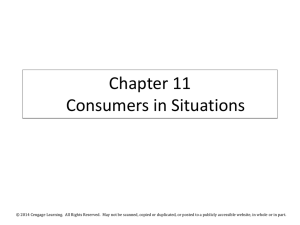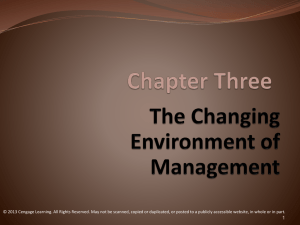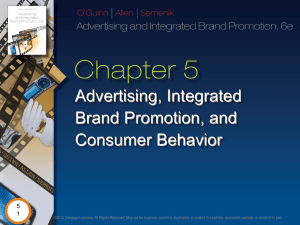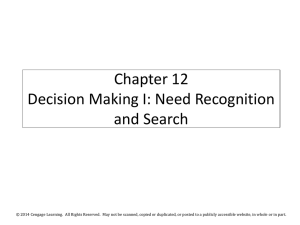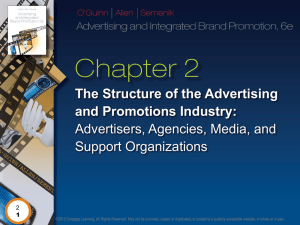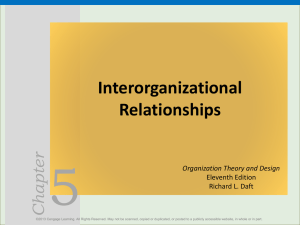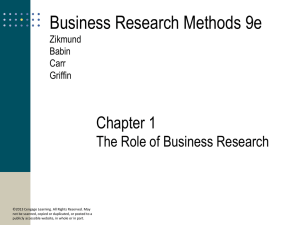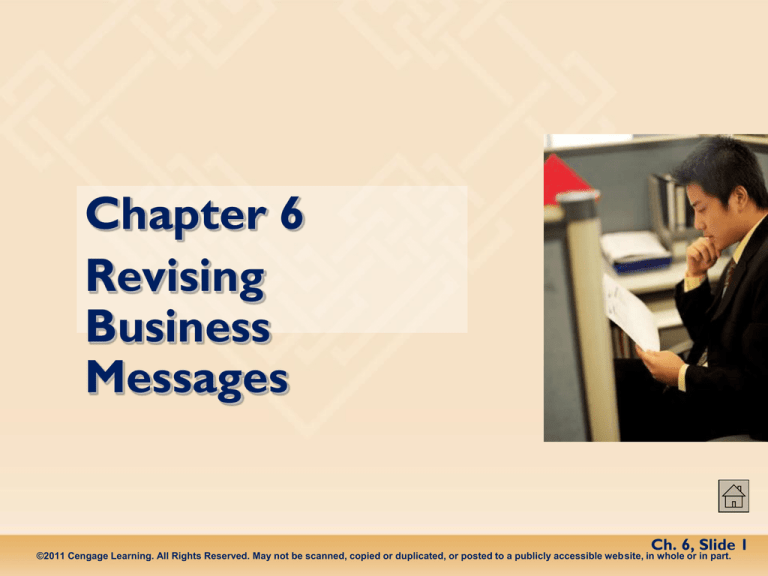
Chapter 6
Revising
Business
Messages
Ch. 6, Slide 1
©2011 Cengage Learning. All Rights Reserved. May not be scanned, copied or duplicated, or posted to a publicly accessible website, in whole or in part.
Revision vs. Editing
Ch. 6, Slide 2
©2011 Cengage Learning. All Rights Reserved. May not be scanned, copied or duplicated, or posted to a publicly accessible website, in whole or in part.
Revision vs. Editing
Revision: The process of adding, deleting,
replacing, and reorganizing words, sentences
and paragraphs so that the final draft has the
characteristics of clear conversational language.
MEANING AND COMMUNATION EFFECTIVENESS
Ch. 6, Slide 3
©2011 Cengage Learning. All Rights Reserved. May not be scanned, copied or duplicated, or posted to a publicly accessible website, in whole or in part.
Revision vs. Editing
Editing: The process of correcting grammar,
spelling, and punctuation errors as well as
producing a document that uses a consistent
style for numbers, abbreviations, and
capitalization.
TECHNICAL CORRECTNESS
Ch. 6, Slide 4
©2011 Cengage Learning. All Rights Reserved. May not be scanned, copied or duplicated, or posted to a publicly accessible website, in whole or in part.
Revision vs. Editing
Thus the goal of Revising and Editing is:
Simplify
Clarify, and
Shorten
Ch. 6, Slide 5
©2011 Cengage Learning. All Rights Reserved. May not be scanned, copied or duplicated, or posted to a publicly accessible website, in whole or in part.
Revise for Clarity, Conciseness,
and Readability
Keep it simple.
Keep it conversational.
Remove opening fillers.
Eliminate redundancies.
Reduce compound prepositions.
Purge empty words.
Ch. 6, Slide 6
©2011 Cengage Learning. All Rights Reserved. May not be scanned, copied or duplicated, or posted to a publicly accessible website, in whole or in part.
Revise for Clarity, Conciseness,
and Readability
Kick the noun habit.
Dump trite “business” phrases.
Develop parallelism (balanced
construction).
Apply graphic highlighting.
Ch. 6, Slide 7
©2011 Cengage Learning. All Rights Reserved. May not be scanned, copied or duplicated, or posted to a publicly accessible website, in whole or in part.
Revising Tips
Ch. 6, Slide 8
©2011 Cengage Learning. All Rights Reserved. May not be scanned, copied or duplicated, or posted to a publicly accessible website, in whole or in part.
Revising Tips
Eliminate flabby expressions.
Wordy
Concise
at this point in time
now
due to the fact that
because
in very few cases
seldom
despite the fact that
although
feel free to
please
Ch. 6, Slide 9
©2011 Cengage Learning. All Rights Reserved. May not be scanned, copied or duplicated, or posted to a publicly accessible website, in whole or in part.
Revising Tips
Limit long lead-ins (unnecessary introductory
words).
Wordy
Concise
This is to inform you that Monday
is a holiday.
Monday is a holiday.
I am writing this letter because
Professor John Donnellan suggested
Professor John Donnellan suggested that your organization was hiring.
that your organization was hiring.
Ch. 6, Slide 10
©2011 Cengage Learning. All Rights Reserved. May not be scanned, copied or duplicated, or posted to a publicly accessible website, in whole or in part.
Revising Tips
Drop unnecessary opening fillers (there is/are
and it is/was beginnings).
Wordy
Concise
There are over 50 visitors who
commented on her blog.
Over 50 visitors commented on her
blog.
There was an unused computer in
the back office.
An unused computer was in the
back office.
It is certainly an inspiring sequence The sequence of events is certainly
of events.
inspiring.
Ch. 6, Slide 11
©2011 Cengage Learning. All Rights Reserved. May not be scanned, copied or duplicated, or posted to a publicly accessible website, in whole or in part.
Eliminate Redundancies
Say it only once!
•
•
•
•
•
•
collect together
contributing factor
past history
basic fundamentals
exactly identical
two twins
•
•
•
•
•
personal opinion
perfectly clear
unexpected
surprise
few in number
first beginning
Ch. 6, Slide 12
©2011 Cengage Learning. All Rights Reserved. May not be scanned, copied or duplicated, or posted to a publicly accessible website, in whole or in part.
Revising Tips
Replace redundancies (expressions that repeat
meaning or include unnecessary words).
Redundant
Concise
exact same
exact or same
past history
past or history
serious danger
danger
new innovation
new or innovation
my personal opinion
my opinion
Ch. 6, Slide 13
©2011 Cengage Learning. All Rights Reserved. May not be scanned, copied or duplicated, or posted to a publicly accessible website, in whole or in part.
Revising Tips
Purge empty words.
In the case of General Motors, the car company was
reorganized.
We are aware of the fact that many managers need
assistance.
When it arrived, I deposited your check immediately.
(Obviously, the check arrived.)
Ch. 6, Slide 14
©2011 Cengage Learning. All Rights Reserved. May not be scanned, copied or duplicated, or posted to a publicly accessible website, in whole or in part.
Revising Tips
Purge empty words.
In the case of General Motors, the car company was
reorganized.
We are aware of the fact that many managers need
assistance.
When it arrived, I deposited your check immediately.
(Obviously, the check arrived.)
Ch. 6, Slide 15
©2011 Cengage Learning. All Rights Reserved. May not be scanned, copied or duplicated, or posted to a publicly accessible website, in whole or in part.
Revising Tips
Keep it simple by avoiding indirect and
pompous language.
Wordy and Unclear
Clear
It would not be inadvisable for you
to affix your signature at this point
in time.
You should sign now.
Here are implements that are
Here are tools to do the job
necessary for the job to be
satisfactorily.
completed in a satisfactory manner.
Ch. 6, Slide 16
©2011 Cengage Learning. All Rights Reserved. May not be scanned, copied or duplicated, or posted to a publicly accessible website, in whole or in part.
Revising Tips
Dump trite “business” phrases (worn-out
expressions).
Trite
Improved
pursuant to your request
as you requested
please do not hesitate to
please
thank you in advance
thank you
enclosed please find
enclosed
Ch. 6, Slide 17
©2011 Cengage Learning. All Rights Reserved. May not be scanned, copied or duplicated, or posted to a publicly accessible website, in whole or in part.
Revising Tips
Drop clichés (expressions that have become
exhausted by overuse), such as
easier said than done
first and foremost
think outside the box
shoot from the hip
Ch. 6, Slide 18
©2011 Cengage Learning. All Rights Reserved. May not be scanned, copied or duplicated, or posted to a publicly accessible website, in whole or in part.
Revising Tips
Drop slang (informal words with arbitrary and
extravagantly changed meanings that quickly go
out of fashion), such as
in the pipeline
down the totem pole
blowing the budget
getting burned
Ch. 6, Slide 19
©2011 Cengage Learning. All Rights Reserved. May not be scanned, copied or duplicated, or posted to a publicly accessible website, in whole or in part.
Revising Tips
Unbury verbs that are needlessly converted to
wordy noun expressions.
Buried Verbs
Unburied Verbs
give consideration to
consider
reach a conclusion that
conclude
create a reduction in
reduce
make a decision about
decide
take action
act
Ch. 6, Slide 20
©2011 Cengage Learning. All Rights Reserved. May not be scanned, copied or duplicated, or posted to a publicly accessible website, in whole or in part.
Revising Tips
Control exuberance (use of intensifiers such as
definitely, quite, completely, extremely, really, and
totally) to sound businesslike.
Excessive Exuberance
Businesslike
We actually are very sure they
do not totally agree with our
decision.
We are sure they do not agree with
our decision.
Ch. 6, Slide 21
©2011 Cengage Learning. All Rights Reserved. May not be scanned, copied or duplicated, or posted to a publicly accessible website, in whole or in part.
Designing Documents for Readability
Setting effective
margins
Choosing the right
typefaces
Including bulleted or
numbered lists
Adding headings
Using short
sentences
Writing short
paragraphs
Ch. 6, Slide 22
©2011 Cengage Learning. All Rights Reserved. May not be scanned, copied or duplicated, or posted to a publicly accessible website, in whole or in part.
Designing Documents for Readability
Use 1 to 1 ½-inch
margins.
How to set margins
Ch. 6, Slide 23
©2011 Cengage Learning. All Rights Reserved. May not be scanned, copied or duplicated, or posted to a publicly accessible website, in whole or in part.
Designing Documents for Readability
Setting for Ragged-Right Margins
Result
Aligns text at left margin and
creates a ragged-right margin
Ragged-right margins provide more white space and improve readability.
Ch. 6, Slide 24
©2011 Cengage Learning. All Rights Reserved. May not be scanned, copied or duplicated, or posted to a publicly accessible website, in whole or in part.
Designing Documents for Readability
Choose appropriate typefaces.
Consider sans serif for headings, signs, and material
that does not require continuous reading (for
example, Arial).
Consider serif for body font (for example, Times
New Roman). Notice that serif typefaces have small
features at the ends of strokes.
Ch. 6, Slide 25
©2011 Cengage Learning. All Rights Reserved. May not be scanned, copied or duplicated, or posted to a publicly accessible website, in whole or in part.
Designing Documents for Readability
Use 10- to 12-point font for most body text.
For special effects consider:
CAPITALIZATION
SMALL CAPS
Boldface
Italic
Underline
Ch. 6, Slide 26
©2011 Cengage Learning. All Rights Reserved. May not be scanned, copied or duplicated, or posted to a publicly accessible website, in whole or in part.
Designing Documents for Readability
Use vertical lists or enumerated items within
sentences to improve comprehension.
Use a numbered list for items that represent a
sequence or reflect a numbering system; use
bullets otherwise.
Use enumerated items such as (a) and (b) within a
sentence.
Make the lists and enumerated items parallel.
Ch. 6, Slide 27
©2011 Cengage Learning. All Rights Reserved. May not be scanned, copied or duplicated, or posted to a publicly accessible website, in whole or in part.
Designing Documents for Readability
Use parallel construction by expressing similar
ideas in balanced, matching constructions.
Not Parallel
The task force recommends buying
a software license, creating software
usage policies, and the benefits of
the software should be
demonstrated.
Ch. 6, Slide 28
©2011 Cengage Learning. All Rights Reserved. May not be scanned, copied or duplicated, or posted to a publicly accessible website, in whole or in part.
Designing Documents for Readability
Use parallel construction by expressing similar
ideas in balanced, matching constructions.
Not Parallel
Parallel
The task force recommends buying
a software license, creating
software usage policies, and the
benefits of the software should be
demonstrated.
The task force recommends buying
a software license, creating
software usage policies, and
demonstrating the benefits of the
software.
Ch. 6, Slide 29
©2011 Cengage Learning. All Rights Reserved. May not be scanned, copied or duplicated, or posted to a publicly accessible website, in whole or in part.
Designing Documents for Readability - Parallel
Setting effective
margins
Choosing the right
typefaces
Including bulleted or
numbered lists
Adding headings
Using short
sentences
Writing short
paragraphs
Ch. 6, Slide 30
©2011 Cengage Learning. All Rights Reserved. May not be scanned, copied or duplicated, or posted to a publicly accessible website, in whole or in part.
Designing Documents for Readability
Use numbered lists to show a sequence:
During the hiring process, follow these steps:
1. Examine the application.
2. Interview the applicant.
3. Check the applicant’s references.
Ch. 6, Slide 31
©2011 Cengage Learning. All Rights Reserved. May not be scanned, copied or duplicated, or posted to a publicly accessible website, in whole or in part.
Designing Documents for Readability
Use bulleted lists to highlight without
necessarily showing a sequence.
Consumers expect the following information at
product Web sites:
Price
Quality
Performance
Availability
Ch. 6, Slide 32
©2011 Cengage Learning. All Rights Reserved. May not be scanned, copied or duplicated, or posted to a publicly accessible website, in whole or in part.
Designing Documents for Readability
Add headings for quick comprehension:
The company needs to focus attention in three key areas:
Attracting applicants. We need to analyze where and how we
advertise for applicants. Specifically, online job boards …
Interviewing applicants. We should consider adding simulated
customer encounters to the process. Simulated …
Checking references. We should consider contacting all
references, not just former employers. Currently, the …
Ch. 6, Slide 33
©2011 Cengage Learning. All Rights Reserved. May not be scanned, copied or duplicated, or posted to a publicly accessible website, in whole or in part.
Designing Documents for Readability
Do not restate things that are sufficiently
implied:
“She took the web design course and passed it.”
Ch. 6, Slide 34
©2011 Cengage Learning. All Rights Reserved. May not be scanned, copied or duplicated, or posted to a publicly accessible website, in whole or in part.
Designing Documents for Readability
Use a compound adjective. Again, that reduces
the number of words:
“…the official who holds the highest rank….”
vs.
“…the highest-ranking official…”
Ch. 6, Slide 35
©2011 Cengage Learning. All Rights Reserved. May not be scanned, copied or duplicated, or posted to a publicly accessible website, in whole or in part.
Designing Documents for Readability
Ch. 6, Slide 36
©2011 Cengage Learning. All Rights Reserved. May not be scanned, copied or duplicated, or posted to a publicly accessible website, in whole or in part.
Designing Documents for Readability
Write Concisely: Short and to the point
Short sentences
Short paragraphs
White space
Ch. 6, Slide 37
©2011 Cengage Learning. All Rights Reserved. May not be scanned, copied or duplicated, or posted to a publicly accessible website, in whole or in part.
What to Watch for in Proofreading
Ch. 6, Slide 38
©2011 Cengage Learning. All Rights Reserved. May not be scanned, copied or duplicated, or posted to a publicly accessible website, in whole or in part.
How to Proofread Routine Documents
For reading messages on screen
Use the down arrow to reveal one line at a time.
Read from a printed copy, to be safer.
In general
Look for typos, misspellings, and easily confused
words.
Study the document for inconsistencies.
Look for factual errors.
Ch. 6, Slide 39
©2011 Cengage Learning. All Rights Reserved. May not be scanned, copied or duplicated, or posted to a publicly accessible website, in whole or in part.
How to Proofread Complex Documents
Print a copy, preferably double-spaced.
Set it aside and take a breather.
Allow adequate time for careful proofing.
Expect errors and congratulate yourself when you
find them.
Read the message at least twice – once for
meaning and once for grammar and mechanics.
Reduce your reading speed and focus on
individual words.
Ch. 6, Slide 40
©2011 Cengage Learning. All Rights Reserved. May not be scanned, copied or duplicated, or posted to a publicly accessible website, in whole or in part.
How to Proofread Complex Documents
Read the message at least twice.
1st for content, organization, and style.
Content: Complete? All of the details necessary? (6
Journalists Questions). Accuracy?
Organization: Main idea – Direct or Indirect
Style: Develop many styles
Ch. 6, Slide 41
©2011 Cengage Learning. All Rights Reserved. May not be scanned, copied or duplicated, or posted to a publicly accessible website, in whole or in part.
How to Proofread Complex Documents
Read the message at least twice.
2nd for mechanical errors.
Grammar, punctuation, , capitalization, number
usage, abbreviations, jargon.
Word substitution (their, there, they’re)
Ch. 6, Slide 42
©2011 Cengage Learning. All Rights Reserved. May not be scanned, copied or duplicated, or posted to a publicly accessible website, in whole or in part.
A Frame of Mind for Effective Revising and
Proofreading
Attempt to see things from your audience’s
perspective
Revise until you cannot see any more ways to
improve them
Be willing to allow others to make suggestions
for improving your writing
Proofread, Proofread, Proofread…
Ch. 6, Slide 43
©2011 Cengage Learning. All Rights Reserved. May not be scanned, copied or duplicated, or posted to a publicly accessible website, in whole or in part.
Revised Digital Document Using
Strikethrough and Color
This is an example of the Strikethrough
and Color functions
Ch. 6, Slide 44
©2011 Cengage Learning. All Rights Reserved. May not be scanned, copied or duplicated, or posted to a publicly accessible website, in whole or in part.
Revised Digital Document Using
Strikethrough and Color
Ch. 6, Slide 45
©2011 Cengage Learning. All Rights Reserved. May not be scanned, copied or duplicated, or posted to a publicly accessible website, in whole or in part.
Basic Proofreading Marks
Delete
Capitalize
Lowercase (don’t capitalize)
Transpose
Close up
Ch. 6, Slide 46
©2011 Cengage Learning. All Rights Reserved. May not be scanned, copied or duplicated, or posted to a publicly accessible website, in whole or in part.
Basic Proofreading Marks
Insert
Insert space
Insert punctuation
Insert period
Start paragraph
Ch. 6, Slide 47
©2011 Cengage Learning. All Rights Reserved. May not be scanned, copied or duplicated, or posted to a publicly accessible website, in whole or in part.
Marked Copy of Printed Document
Ch. 6, Slide 48
©2011 Cengage Learning. All Rights Reserved. May not be scanned, copied or duplicated, or posted to a publicly accessible website, in whole or in part.
Revised Copy of Printed Document
Ch. 6, Slide 49
©2011 Cengage Learning. All Rights Reserved. May not be scanned, copied or duplicated, or posted to a publicly accessible website, in whole or in part.
Evaluating a Business Message
Ch. 6, Slide 50
©2011 Cengage Learning. All Rights Reserved. May not be scanned, copied or duplicated, or posted to a publicly accessible website, in whole or in part.
END
Ch. 6, Slide 51
©2011 Cengage Learning. All Rights Reserved. May not be scanned, copied or duplicated, or posted to a publicly accessible website, in whole or in part.


